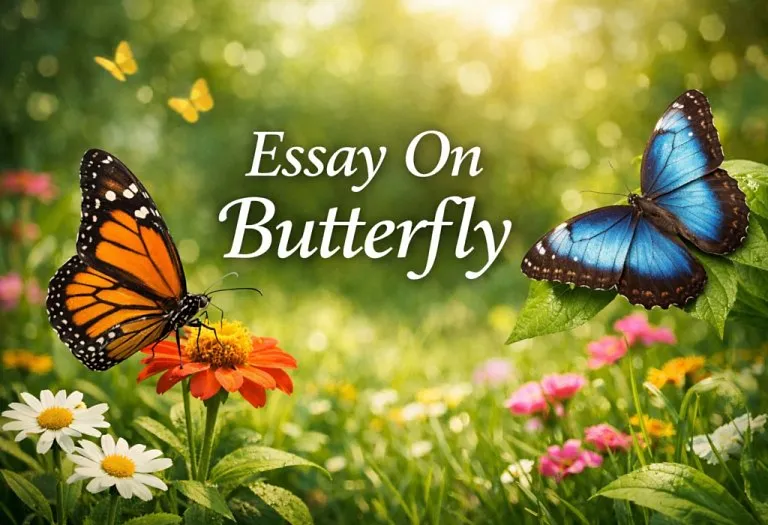Essay On River – 10 Lines, Short and Long Essay for Children & Students
Learning About Nature Through a Meaningful Essay on River.
- 5 Lines on River
- 10 Lines on River
- A Paragraph on River
- Short Essay on River
- Long Essay on River
- What Will Your Child Learn From the Essay on the River?
- Key Points to Remember When Writing an Essay on the River
- FAQs
From the babbling brooks of our childhood stories to the majestic rivers that define the landscapes of our world, rivers have always held a special place in our hearts and imaginations. If you’re reading this, chances are you’re a student looking for an essay on the river in English. This essay will provide you with vital information about rivers and emphasise the importance of essay writing in honing your communication skills. An essay for students is a canvas where young minds paint their thoughts, ideas, and observations. So, let’s dive deep into the mesmerising world of rivers and explore their significance.
5 Lines on River
If you are looking for an essay for class 1 & 2 students, you might want to start with the 5 lines on the river. These are easy to begin with for children beginning to learn how to write an essay. Here are a few lines on the river:
- A river is a natural body of water that transports freshwater from mountains and other water sources.
- A river helps create numerous wetlands and is home to several fish.
- People depend on rivers for food, water, farming, tourism, swimming, and livelihood.
- The River Nile is the longest river in the world, and the Amazon River is the world’s largest.
- Rivers are a symbol of life, sustenance, and renewal.
10 Lines on River
Introducing rivers to young learners can be a delightful journey of discovery. This brief essay for lower primary classes is designed to provide an easy-to-understand overview of rivers. Let these ten lines serve as a foundation for young minds to appreciate the beauty and significance of these water bodies.
- Rivers are long streams of water that flow across the land.
- They start from mountains or hills and travel to seas or oceans.
- People use river water for drinking, farming, and washing.
- Many animals, like fish, crocodiles, and turtles, live in rivers.
- Rivers help transport goods from one place to another on boats.
- Some big rivers are the Nile, Amazon, and Ganges.
- Rivers can be calm and peaceful or fast and noisy with rapids.
- We can enjoy fun activities like fishing, boating, or watching the flow.
- It’s essential to keep our rivers clean and not throw waste into them.
- Clean rivers make our Earth beautiful and help preserve many species.
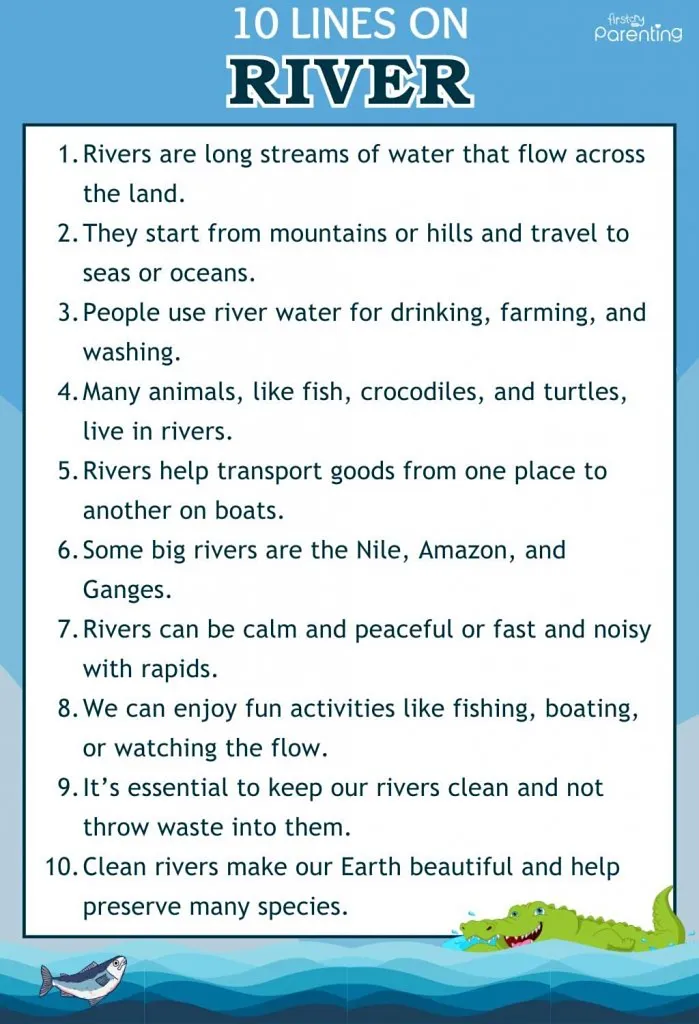
A Paragraph on River
Understanding the essence of rivers in just a few lines on the river can be challenging, given their vast significance in our lives. However, for those seeking a concise paragraph in English that captures the river’s spirit, the following should prove insightful:
Rivers, nature’s lifelines, meander gracefully through terrains, bestowing life and vitality wherever they flow. From their humble beginnings in mountain springs to their majestic confluence with the seas, they serve as ecosystems teeming with diverse life, sustenance sources, and continuity symbols. Rivers have not only shaped the physical landscapes of our Earth but also deeply influenced human civilisations, cultures, and histories. They beckon with tales of yore, whispered with every ripple, reminding us of nature’s boundless beauty and our intrinsic connection.
Short Essay on River
Rivers, with their ceaseless flow and serene presence, have always been a source of fascination and reverence for many. Serving as the lifeblood of our planet, they hold tales of time, history, and civilisation. In this short essay, we shall delve deeper into understanding rivers’ essential role and significance in our lives and the world at large.
Rivers are not just bodies of flowing water; they are the pulse of the Earth, sustaining life in different forms. Since ancient times, they’ve played a significant role in nurturing civilisations, providing fertile agricultural land, enabling trade and transport, and providing fresh water for consumption and daily activities. Beyond their practical uses, rivers have spiritual and cultural significance in many cultures, including those of the Aztecs, Egyptians, Greeks, Mesopotamians, and Indians. They are often revered as deities and celebrated in festivals and rituals. However, in contemporary times, these magnificent waterways face threats from pollution, over-extraction, and climate change. The dumping of garbage, industrial waste, the construction of dams, overfishing, and more have harmed the rivers in more ways than one.
We, the custodians of this planet, must recognise their value and work towards their preservation. After all, by safeguarding rivers, we’re preserving our heritage and ecosystems and ensuring a sustainable future for generations to come. Let’s pledge to keep our rivers clean and healthy.
Long Essay on River

The beauty and majesty of rivers have been a timeless source of inspiration and wonder for people worldwide. These flowing marvels hold tales of bygone eras, shaping civilisations, ecosystems, and landscapes. As we delve into this long essay for class 3 and above classes, we’ll explore the multifaceted dimensions of rivers, ranging from their significance to the various challenges they face in contemporary times.
Rivers are like the veins of our planet, flowing through landscapes and giving life to everything around them. They’re not just water; they’re full of stories, connecting different parts of the world and bringing people together.
Significance of the River
The importance of rivers extends beyond their aesthetic appeal and holds deep-rooted implications for life and society.
- Source of Freshwater: They provide drinking water to billions of people and support agricultural activities essential for food production (3).
- Biodiversity Reservoirs: Rivers are habitats for numerous aquatic species, from fish to amphibians and invertebrates (4).
- Economic Importance: They facilitate trade, transportation, and fishing activities, contributing significantly to economies (5).
- Cultural and Spiritual Significance: Many rivers are deemed sacred in various cultures and religions, often being sites for pilgrimage and ceremonies.
- Recreational Value: They offer opportunities for boating, rafting, and other water-based recreational activities.
- Natural Beautification: Rivers beautify landscapes, creating picturesque scenery that attracts tourists and nature enthusiasts.
- Geographical Significance: They play a crucial role in shaping the topography, leading to the formation of valleys, plains, and deltas.
Cons of River
Despite their numerous advantages, rivers do come with certain drawbacks:
- Floods: When water levels rise beyond the river’s capacity, devastating floods can occur, causing loss of life and property.
- Erosion: Over time, rivers can erode their banks, losing agricultural lands and infrastructure.
- Stagnant Pockets: In some places, rivers can form stagnant pools, which can become breeding grounds for disease-carrying vectors like mosquitoes.
Challenges and Threats Rivers Face
Rivers today face multiple challenges, some natural and others induced by human activities:
- Pollution: Industrial effluents, sewage, and agricultural runoff have polluted many rivers, making their water unsafe for consumption and aquatic life.
- Over-extraction: unsustainable withdrawal for agriculture, industries, and domestic use reduces river flow.
- Deforestation: Loss of forests in river basins can lead to sedimentation and altered water flow.
- Dam Construction: While dams provide water storage and electricity, they can disrupt rivers’ natural flow and ecology.
- Encroachments: Illegal settlements and riverbank construction can reduce flow and increase flood risks.
- Climate Change: Changing rainfall patterns and melting glaciers can alter river flow and seasonal dynamics.
- Loss of Wetlands: Wetlands, which act as buffers and cleaners, are being destroyed, impacting river health.
How Can We Save/Conserve Our Rivers?
Conserving rivers is not just the duty of governments and organisations; each of us has a role.
- Raise Awareness: Educate communities about the importance of rivers and the threats they face.
- Promote Sustainable Practices: Encourage water-saving techniques in agriculture and households.
- Reforestation: Planting trees in river basins can prevent soil erosion and maintain water quality.
- Laws and Regulations: Implement and enforce strict regulations against river pollution and encroachments.
- River Clean-Up Drives: Organise and participate in initiatives to remove waste from rivers.
- Promote Research: Support studies that aim to understand river ecosystems better and find sustainable ways to utilise them.
What Will Your Child Learn From the Essay on the River?
Through the essay on rivers, your child will be on a journey of discovery, gaining a deeper understanding of these remarkable natural features. They’ll learn that rivers are more than just bodies of water; they’re essential lifelines for our planet. By exploring the essay, they’ll uncover the ecological significance of rivers, discovering how they support diverse ecosystems and provide habitats for countless plants and animals. Additionally, they’ll appreciate the cultural significance of rivers, understanding how these waterways have shaped human civilisations throughout history, serving as centres of trade, transportation, and settlement.
Key Points to Remember When Writing an Essay on the River
Writing about rivers can be as fluid and dynamic as the rivers themselves. However, to ensure that your river essay flows smoothly and captures the essence of its subject, consider the following key points:
- Choose Your Focus: Decide whether you want to write about a specific river, the general concept of rivers, their historical significance, or their ecological importance.
- Incorporate Personal Experiences: If you’ve visited a river, share your observations and feelings. Personal anecdotes add warmth and depth to your essay.
- Research is Vital: While personal experiences are valuable, you must back up your statements with facts. Research rivers’ geographical, historical, and ecological aspects to add credibility to your essay.
- Highlight the Importance of Rivers: Discuss how rivers have shaped civilisations, influenced cultures, and have been vital sources of sustenance and livelihood.
- Address Environmental Concerns: Many rivers are at risk of increasing pollution and global warming. Highlight the need for conservation and sustainable practices.
- Conclude with a Thought-Provoking Statement: Challenge your readers to think about the importance of rivers in their lives and the larger world.
FAQs
1. Are there any famous rivers known for their biodiversity?
The Amazon River in South America stands out as a prime example, renowned for its exceptional biodiversity. It’s home to thousands of fish species, many of which are not found anywhere else in the world, along with many other aquatic and terrestrial species (1).
2. How do climate changes affect rivers?
Climate changes impact rivers by altering flow patterns, causing excessive droughts or floods. Additionally, the rise in temperatures can lead to melting glaciers and snow, resulting in changed water volumes and potentially harming aquatic ecosystems (2).
3. How are humans damaging rivers?
Throwing of garbage, sewage waste, agricultural runoff, and industrial waste, overfishing, and constructing dams disrupt the ecosystem in the river, affecting the river overall and its quality.
4. How can we save rivers on an individual note?
By not throwing garbage in rivers, using eco-friendly products that do not damage the environment, conserving water by taking short showers, using water sparingly, watering plants and garden only when necessary, participating in local stream or river cleanup events, and planting more trees, we can help reduce our major dependability on water and ultimately save rivers.
Rivers, the silent witnesses to aeons of Earth’s history, are indispensable to life, culture, and ecosystems. Their intricate dance with humanity has shaped civilisations, and their well-being reflects our planet’s health. As stewards of nature, it is our collective responsibility to cherish, protect, and ensure the sustainable future of these magnificent waterways for generations to come.
Also Read:
Essay On Wild Animals
Amazon River Facts For Kids
Facts About Nile River for Kids
Was This Article Helpful?
Parenting is a huge responsibility, for you as a caregiver, but also for us as a parenting content platform. We understand that and take our responsibility of creating credible content seriously. FirstCry Parenting articles are written and published only after extensive research using factually sound references to deliver quality content that is accurate, validated by experts, and completely reliable. To understand how we go about creating content that is credible, read our editorial policy here.






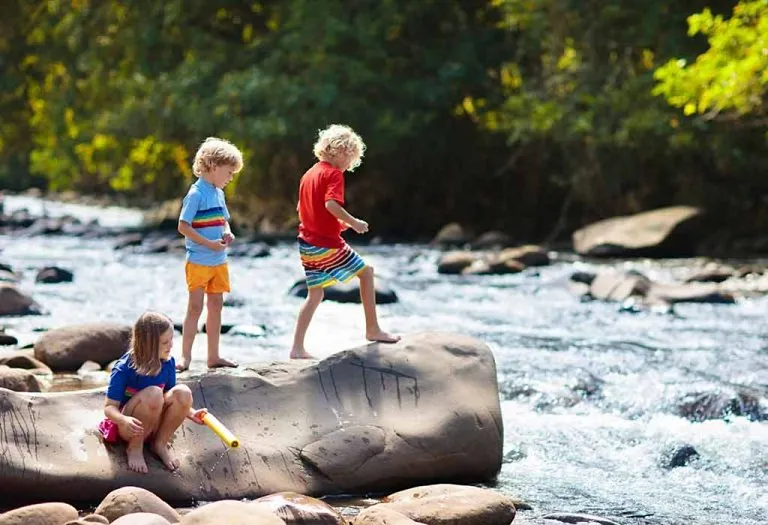
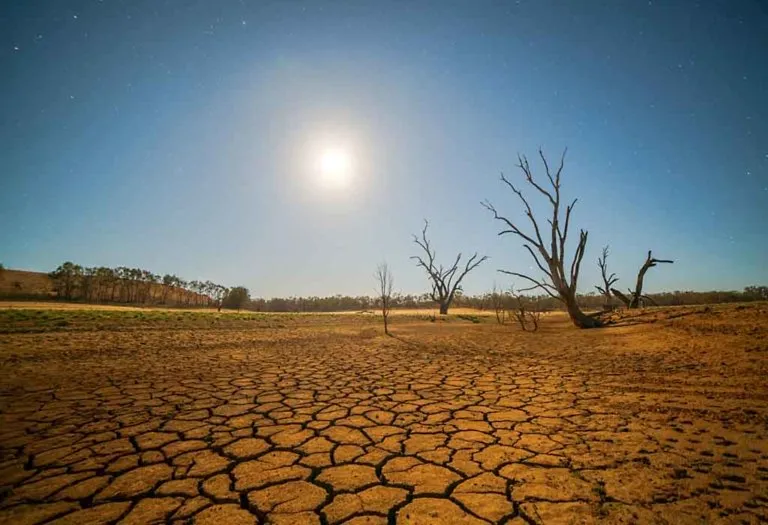
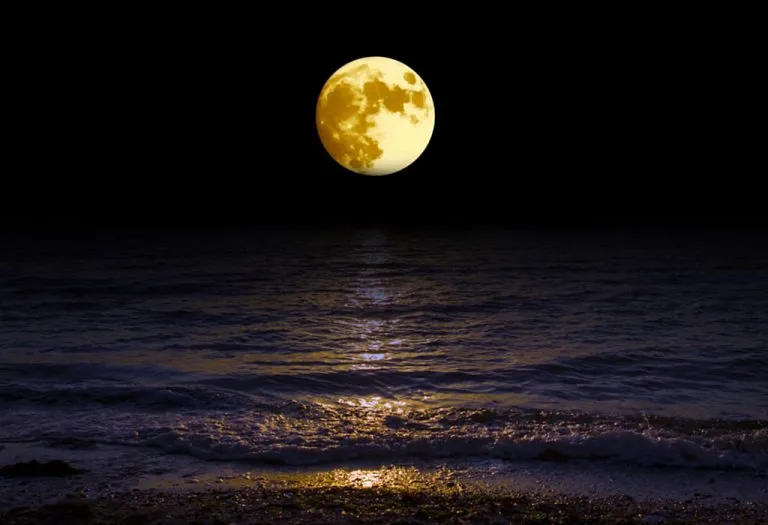





.svg)







